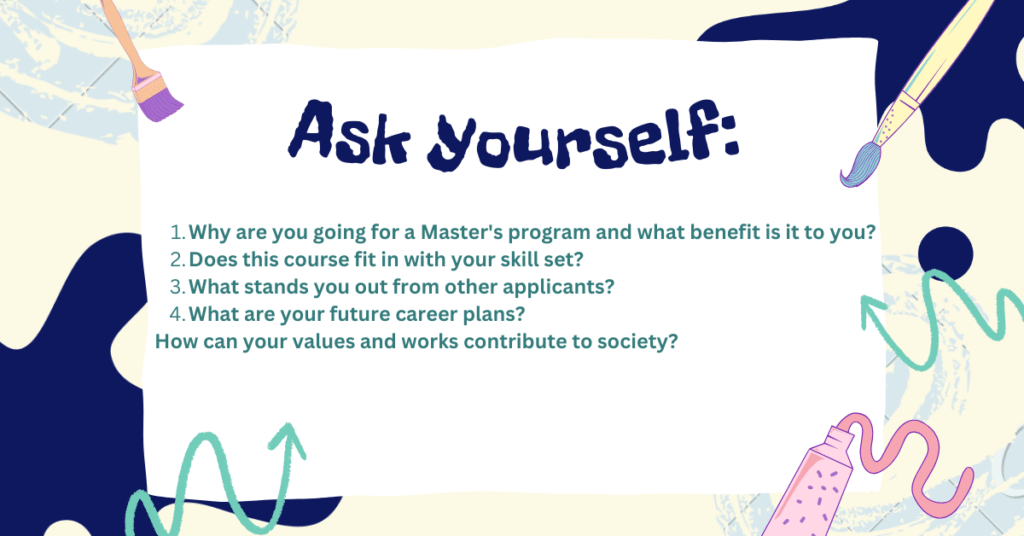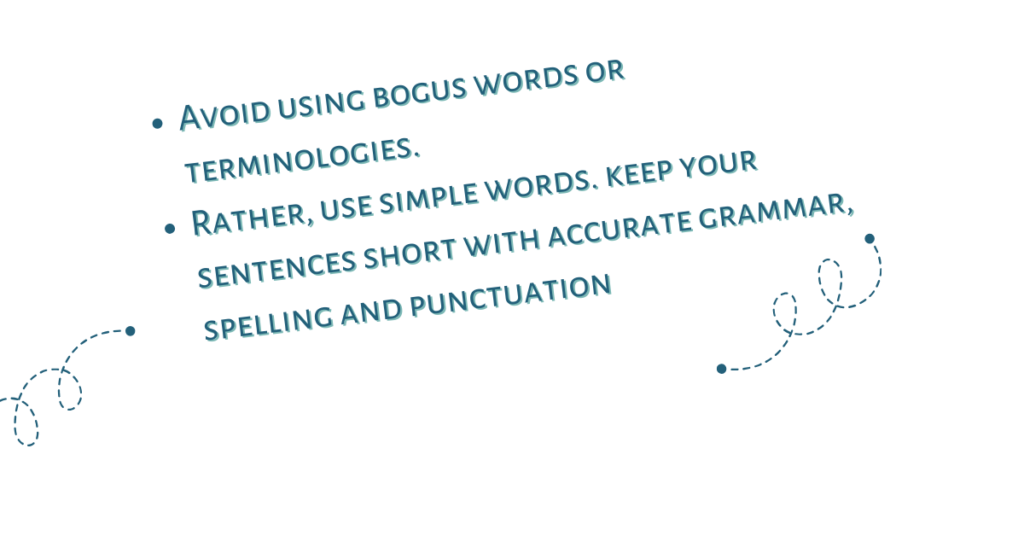Your personal statement not only puts your best foot out in your Masters’ application, it helps convince the admission committee that you are the best fit for your course of choice.
When writing a Personal Statement for Masters, avoid starting with generic statements or overused cliches like ‘I have always had a passion….’ or ‘I always wanted to study…’ Your writing must be natural and impactful.
Your opening sentence should be the reason (s); ‘Why’ you want to study the particular course plus your potential to complete it. But before you write a word of it, you should have done your research to have a good understanding of the course you are applying for and how it relates to your future career goals.
You should also know that because of the relatively short nature of Personal statements, you need to maintain clarity and precision.
Customise it according to the specific requirements of the Masters’ program while discussing only academic and career interests.
Don’t waste your space writing autobiographical information or details about your personal life. You can see samples of personal statement for master’s scholarship.
Before you start writing your personal statement, check the institution’s guidelines.
Although there is no laid down rule on how to write a personal statement for Masters program, I believe that these tips below will be of immense value to you from my experience.
How to Write a Personal Statement for Masters
Planning a Personal Statement
- Read the application criteria carefully to understand clearly what information is required of you. Visit the University website for more details. Endeavour to follow instructions closely.
- Research the course, faculty or department and the University thoroughly.
You should be able to show why you want to study the course. And that’s not all, if the course has specific entry requirements, you should show how you intend to meet the requirements.
It’s not enough to speak about your enthusiasm for the course. Go deeper to demonstrate it through your knowledge of the course, department and the university.
If you are applying for more than one course, research each course differently, even if the courses are similar. Do not use the same statement to apply to all of them.
Questions That Will Help You Start Writing Your Personal Statement

Answering these questions below will give you a great start in writing your personal statement for Masters.
- Why are you going for a Master’s program and what benefit is it to you?
- Does this course fit in with your skill set?
- What stands you out from other applicants?
- What are your future career plans?
- How can your values and works contribute to society?
You should also know that if you are applying for a course different from your field of undergraduate study, you need to tell the institution why you are changing your field of study.
What Should I Include in a Personal Statement for Masters
- Your specific reason or reasons: Discuss why you are applying for this course and why you chose this particular university. Write your academic interests and career goals.
- Mention the university and department’s ranking. Write about the modules of the course that are most relevant to your career and how they fit into the reason why you chose the course.
- Demonstrate how they have prepared you in readiness for the demands of the course you are going for. Explain how the course links to or builds on your previous academic achievements.
- Your Professional or Work experiences: Discuss relevant work experiences including- projects, and volunteer activities you were involved in. Use your responsibilities and the tasks you performed to show what you gained from the experience using the STAR principle -Situation, Task- Action and Result.
Make sure the example you are using relates to the course you are applying for. You are also expected to show its relevance to your future career plans.
For example, overcoming a challenge, because of a health-related condition, and sharing it can show evidence of your strength and perseverance. These skills can show how you can perform in the course and also contribute to the department. Using more recent examples of your experience and skills is hugely preferable.
- Your Future Plans: Discuss your career goals and aspirations and explain how studying your chosen course will help you to achieve them.
How do I structure a Personal Statement?
When writing a personal statement, structure each paragraph to follow a logical pattern to ensure a high level of professionalism. Each paragraph should build on the one before it.
For the best presentation, structure the entire document into; an interesting Introduction, engaging middle paragraphs and a concluding part.
- Your introduction is where you write your strong reason or motivation for applying for a Masters Program. Write it with an enthusiasm that will encourage the reader to read the entire content.
- In the middle paragraphs, engage your reader with why you are the best candidate for your chosen course. Detail all your experiences, knowledge, skills and interests.
- Use short sentences for easy comprehension. You can also use headings to break the content into easy-to-understand portions.
- Your conclusion should summarily reflect your middle paragraphs, summing up your academic and professional background.
What Language should I use to write a Personal Statement?
Write your introduction in a positive, exciting, enthusiastic yet professional language that will draw your reader all in.
Avoid using bogus words or terminologies. Rather, use simple words. keep your sentences short with accurate grammar, spelling and punctuation.
Your Personal Statement written in an active, engaging tone will make your application stand out.

FAQS on How To Write a Personal Statement for Masters
How Do You Start a Personal Statement for Masters Examples?
Start with a catchy introduction. If you experience a struggle, don’t dwell on it.
If you try too much, you might fall into using generic statements which will weaken your personal statement. Go on and write the other parts. You’ll most likely draw inspiration from the other paragraphs. Then come back and tackle the introduction.
How Do You Format a Personal Statement for a Masters Program?
Generally, there are no set rules about the format of a Masters personal statement but on average, 1-2 pages of A4 paper is considered appropriate. Even though some institutions set their own word count or character limit. You can use Times New Roman or Arial fonts, size “12”.
How Do You Write a Masters Personal Statement With No Experience?
A sincere approach is to ask yourself these questions;
- What is so interesting about this Masters program that I want to pursue?
- What have I done in academics or a career that is related to the field of study?
You see, it doesn’t have to be a huge achievement to be relevant. Is there a work that appeals to you so much that you are willing to do it for free? That is your passion! Your passion is a good enough motivation for you to apply for a course in the Masters Program. Now, spend time and discover how it relates to your chosen course and include it in your personal statement.
One good thing you should know is that the admission committee is not expecting all applicants to be professional experts. But saying you have no experience in life is not good for any graduate institution.
How Long Should a Personal Statement Be for Masters?
Most times, different programs have different guidelines and requirements, so always check the application criteria for how long the personal statement for a Masters is expected to be and stick to their instructions.
But if the guideline for the length is not stated, the typical length should be between 500-1000 words. At most aim for a 1-2 page document.
What Is a Good Sentence Starter for a Personal Statement?
Usually, a short sentence explaining your motivation for the course and why you want to study the course is a good start. Demonstrate your understanding of the course and how it relates to the problem you want to solve with the knowledge you’ll gain from the Masters program. Don’t beat around with uninteresting statements, or overused sentences. Enthusiastically communicate your points succinctly.
How Do You Write an Introduction for a Personal Statement?
When writing an introduction for your personal statement, focus on stating the problem you want to solve with the knowledge you’ll gain from your chosen course. Don’t be afraid to discuss your excitement about the program and how it fits into your future career plan.
The admission committee wants to see your commitment to solving a specific problem and making a real impact.
What Should You Not Write in a Masters Personal Statement?
- Personal issues irrelevant to the course
- Inspirational quotes, cliches, humour and overused sentences.
- Non-factual experiences, your stories must be real and verifiable.
- Skills and experiences irrelevant to your course
- Your failures and regrets
- Any claim that you have no evidence to back it up
- Poor grammar and spelling
Final Thought
To write a good personal statement, you must start early. Do your best to avoid the last-minute rush. Take note of the application deadline to guide your writing time. A helpful tip is to visit the university website for further details about the program.
Additionally, avoid copying any content from online sources like personal statement templates for masters without editing it. Keep your writing simple. Use your own words and your statement will be naturally original.
Always proofread your writing to correct grammatical or spelling errors. Read and re-read the document over and over again. You can also give it to someone else to read and point out corrections if need be so that you can correct them before you submit it.






